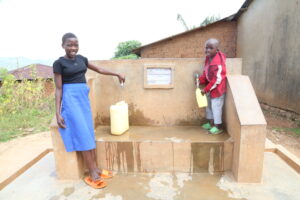By Will Beeker

Source: Wells Bring Hope
Access to clean drinking water in Niger provides numerous benefits, one of which is a reduction in violence in its many forms.
Studies have shown a connection between water scarcity and violence in the Sahel region of Africa, but also anywhere there is limited access to clean water. Even small variability in rainfall is linked with an increase in violence in the region and some even claim that much of the violence in and around Niger can be attributed to water scarcity-induced migration.
How does water scarcity lead to violence?
There are many forms of violence that can stem from a lack of access to clean water:
- Competition for access to water supplies can lead to violence between farmers and herders, sometimes involving national militaries and police forces.
- Water scarcity hinders economic and social development, which can lead to radicalization and its associated violence.
- Women are forced to make long journeys many miles from their homes to fetch water, which can put them at risk of gender-based violence.
- Villagers may have to travel through militarized zones where fighting occurs to reach a water point.
- Migrants fleeing violence put extra strain on already limited water supplies, which can lead to tension and conflict with hosting communities.
As Hycinth Banseka, the technical director for the Lake Chad Basin Commission, has put it: “Escalating impacts of climate change and water scarcity are likely to provoke more conflict if water access isn’t improved for the different communities. We need to develop strategies to ensure that wherever people live, they have access to the water that they need allowing them to develop their economic activities and maintain their communal organizations and ties.”
Any time groups are forced to compete for limited natural resources, there’s bound to be conflict. However, the correlation goes both ways: when there is greater access to water, there’s bound to be less conflict.
How can water security reduce violence?
- As water access becomes more widespread, farmers and herders have less need to fight over limited water supplies.
- Water security, and the economic and social development associated with it, reduce radicalization, meaning people will be less likely to join violent militant groups.
- Water security can reduce the distance women and children need to travel to fetch clean drinking water, making them less vulnerable to attack.
- When wells are drilled in the villages that need them, they are less susceptible to control by a hostile outside group and villagers can avoid dangerous areas.
- Water security allows safe havens to support more migrants, helping them respond to the greater need for water.
The borewells drilled by Wells Bring Hope equip villages with a safe, local source of clean drinking water, improving water security and reducing violence in all the above-mentioned ways. Villagers become safer and healthier, and in turn the whole region benefits.
Sources:
https://www.csis.org/analysis/supporting-water-programming-sahel
https://www.tandfonline.com/doi/full/10.1080/01436597.2022.2083601
https://journals.sagepub.com/doi/abs/10.1177/0022343311426165
https://genevasolutions.news/explorations/the-water-we-share/how-can-water-drive-peace-in-the-sahel
https://www.eib.org/en/stories/niger-water-development
https://blogs.worldbank.org/water/water-security-way-out-conflict-climate-risk-trap-lake-chad-basin

